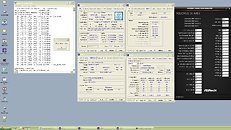Tuesday, July 3rd 2018

Core i7-8700K Overclocked to 7.34 GHz (3c/3t) on Z270 Chipset, Bags SuperPi Record
German professional overclocker Dancop got the Intel Core i7-8700K processor to work on an ASUS ROG Maximus IX Apex (Z270) motherboard, something that's not supposed to work. CPU-Z screenshots seem to confirm this unholy union between the 6-core "Coffee Lake" processor and a 200-series chipset motherboard, using a custom "0084" BIOS dated 11th June, 2018. Dancop then proceeded to overclock the chip to 7344 MHz using extreme cooling, and 2x 8 GB (dual-channel) DDR4-4000 memory. This bench-stable build was then used to bag a SuperPi 32M world-record.
There's a rather big catch, though. Half the cores on the i7-8700K were disabled, and so was HyperThreading (not that it's relevant to SuperPi). The 3-core/3-thread chip was still bench-stable at 7344 MHz, crunching SuperPi 32M in a world-record 7.609 seconds. The clock speed was achieved by dialing up the multiplier to 73.0x, with the base-clock probably untouched, at 100.61 MHz (with the +0.61 MHz probably being variance). Supporting this clock was a blistering core voltage of 1.984 V. A liquid-nitrogen evaporator was used to tame the CPU and motherboard VRM. Find the validation in the source link below.
Source:
Dancop (HWBot)
There's a rather big catch, though. Half the cores on the i7-8700K were disabled, and so was HyperThreading (not that it's relevant to SuperPi). The 3-core/3-thread chip was still bench-stable at 7344 MHz, crunching SuperPi 32M in a world-record 7.609 seconds. The clock speed was achieved by dialing up the multiplier to 73.0x, with the base-clock probably untouched, at 100.61 MHz (with the +0.61 MHz probably being variance). Supporting this clock was a blistering core voltage of 1.984 V. A liquid-nitrogen evaporator was used to tame the CPU and motherboard VRM. Find the validation in the source link below.


75 Comments on Core i7-8700K Overclocked to 7.34 GHz (3c/3t) on Z270 Chipset, Bags SuperPi Record
A gem of a CPU. He could have run 2 cores as well.
I can bet you nobody on this forum could get this result even at the same clocks, simply because it's more than just cpu clock.
It's plenty of DRAM tuning, which (from the dram reviews) is beyond not only the people doing the DRAM reviews but most certainly the audience (as gathered from what gets written here).
Either way, glad he is pushing the limits of what is possible with silicon.
Like, holy hell quit being so negative.
Something like Cinebench 15 is far more relevant as it shows real compute power and the amount of work a modern multi core CPU can do.